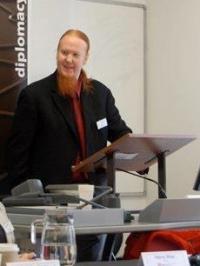
This talk explores the role of public opinion and social-protest through a case-study of the Nuclear Weapons Freeze Campaign of the 1980s. The Freeze campaign grew in parallel to the onset of the administration of Ronald Reagan and an increasingly tense Cold War, responding with a simple and easy solution to the escalating arms race: a bilateral freeze on the production, deployment, and testing of nuclear weapons. The campaign soon spread across American society, influencing Just War and pro-life debates among Catholic Bishops, becoming a theme within popular movies, television shows, and music, and receiving bipartisan support within the Congress. Drawing extensively on newly declassified documents from the archives of the Ronald Reagan Presidential Library, memoirs of Reagan administration officials, Freeze activists, and extensive media sources, this talk argues the Reagan administration was forced to co-opt the antinuclear message emanating from the Freeze campaign, or else continue to face a growing backlash with potential electoral repercussions.
Henry Maar is a Ph.D. candidate in the History Department at the University of California, Santa Barbara. His research focuses on the role of public opinion and movements of social-protest in the shaping of American foreign policy. His dissertation, “The Challenge of Peace: Public Opinion, the Reagan Administration, and the Movement to Freeze the Arms Race,” uses newly declassified documents from the Ronald Reagan Presidential Library to assess the influence of the Nuclear Freeze movement on American foreign policy and the Cold War. He is completing his Ph.D. with the support of a Nuclear Security Dissertation Fellowship from the UC Institute of Global Conflict and Cooperation (IGCC).


